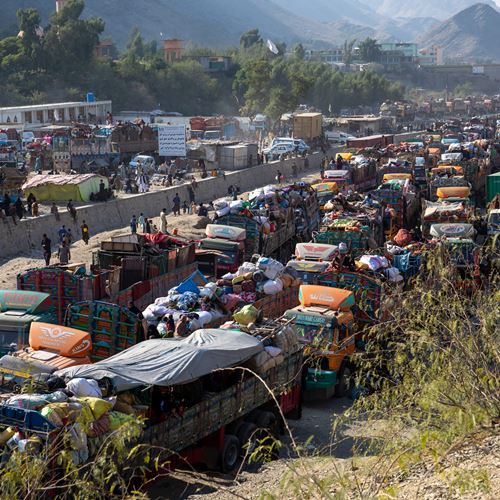Aid organisations NRC, DRC, and IRC have observed a dramatic surge in the number of people returning to Afghanistan from Pakistan since Pakistan’s announcement that all undocumented Afghans must vacate the country by 1 November or risk deportation. The daily number of arrivals, which now ranges between 9,000 and 10,000 individuals, marks a stark contrast to the previous average of approximately 300 individuals a day before the announcement on 15 September 2023. As many as 1.7 million people could be affected.
The conditions in which they arrive in Afghanistan are dire, with many having endured arduous journeys spanning several days, exposed to the elements, and often forced to part with their possessions in exchange for transportation.
The organisations' teams stationed in the areas where people are returning from Pakistan have reported chaotic and desperate scenes among those who have returned. For many, leaving their temporary refuge in Pakistan was not a matter of choice but a rushed necessity. "I am stressed and worried about what to do now. We used to sell tea in Pakistan, but what can we do here? There are no job opportunities in Afghanistan, and I don't have any property or house here," said one deported Afghan in Afghanistan's Nangarhar province.
NRC, DRC, and IRC share grave concerns about the prospects for survival and reintegration of returnees from Pakistan into Afghan society, particularly with the onset of winter.
Neil Turner, NRC's country director in Afghanistan said: "The recent surge of Afghans returning from Pakistan has overwhelmed our resources and the fragile infrastructure in Afghanistan. People arrive in a terrible condition, having often sold what little they had to pay for the journey. We are deeply concerned about their well-being as well as the strain it places on our already stretched humanitarian efforts."
Zia Mayar, DRC's interim country director in Afghanistan said: "Our teams are on the ground witnessing the desperation of those returning to a country already grappling with immense challenges, and with no house or land to go back to. The Afghan people need increased support at a time where funding is sharply decreasing. We call on the international community to act swiftly to address this unfolding crisis."
Salma Ben Aissa, IRC's country director in Afghanistan said: "The situation in Afghanistan is dire. With an existing population of over six million internally displaced individuals living in dire conditions, the Afghans returning from Pakistan face a bleak future, particularly for those who have been living in Pakistan for decades. We urgently need international support to provide shelter, food, and healthcare for these vulnerable people."
Regrettably, Afghanistan, still reeling from decades of conflict, recent devastating earthquakesand a crippling economic crisis, has little to offer, leaving those who return with few prospects to rebuild their lives. The Afghan people need long-term sustainable solutions to end the humanitarian crisis, including much-needed development assistance that international donors do not currently fund.
